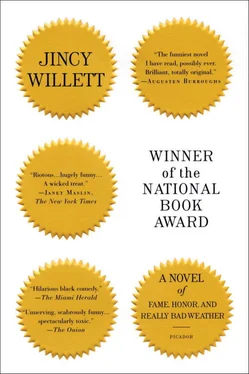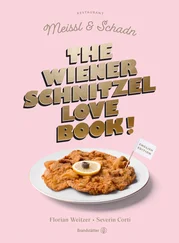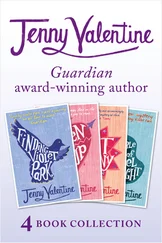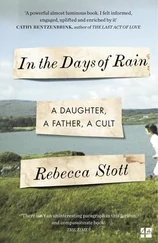The DeVilbisses had returned from France, but Guy was too preoccupied with his “work” to spend much time with Conrad and Abigail, and they ended up living two miles down the road from Anna and me, in a rundown rental, and by year’s end the honeymoon was over. They fought constantly, often with their fists and whatever heavy objects were handy. Both of them spent about the same amount of time in the local emergency room. She never called on me for help, and when I telephoned her, which I did once a week, she never sounded in the least pathetic. She was not, in those last months anyway, a victim.
I think now that she hated him from the time we left Agincourt, and that she took as much pleasure in the battle as in the bed, and that she intended all along to kill him. I don’t mean that she provoked the final fight just so she could run him over. My sister is not a sneak. But she’s no fool either, and when the opportunity presented itself, she took it.
She called me right afterward, from a private house a block from the site of what Miles Minden calls “the reckoning.” It was mid-February, almost exactly a year after our last night at Agincourt, and it was snowing, and midnight, and she was on my mind. I picked up on the first ring. “It’s over,” she said, and instantly I knew, more or less, what this meant. I remember that as she began to explain her voice shook, and that I closed my eyes and steadied myself against the kitchen wall. He was gone. It was an accident, she said. I backed over him.
We were twins. I could ask her anything. I took a breath, but before I could put the question, she said, “Eight times.”
Did we laugh then, in perfect unison? Barking like harpies? I don’t remember. Yes, I do.
On her final page Hilda manages to drag Shakespeare into it, and she ends with my sister as Mistress Quickly, and so Conrad Lowe is not in hell, but “in Arthur’s bosom; if ever man went to Arthur’s bosom.” Which, if no man ever went to Arthur’s bosom, is certainly true; though it’s pushing it to imagine that he spent his final moments babbling of green fields. Yet, I am moved, despite Hilda’s foolishness, or perhaps on account of it. She is true to her silly self. In the end, who deserves mercy? Everyone or no one.
My sister, who is much smarter than Mistress Quickly and measurably less soft of heart, never talks directly about Conrad Lowe. As far as I have been able to tell, she misses only her old life, which she plans to resume as soon as she’s acquitted—or, more likely, freed without trial, charges dropped: lately Miles has hinted that the D.A. seems ready to throw in the towel. She has wallowed in all the attention, to a degree that has threatened to drive me mad, but in the end I think she will quit the national stage, and content herself with local notoriety. Rhode Islanders tend to stay put. Everything we know is here.
Hilda mourns him; Abigail does not. I wonder if she misses her love for him, if indeed that was what it was. She surprised me once, in the early days of her strategic sojourn at the ACI, when I offered to argue Miles out of keeping her there. She had just spent fifteen minutes railing against the narrow lumpy mattress and the goddamn chicken à la king and the nerve of her lawyers warning to keep her hands off the prison guards, “As if, ” she huffed, rolling her eyes toward the especially unappetizing specimen stationed in the visiting room. Say the word, I told her, and I’ll figure out a way to take you home. For a while she was silent, her face impassive, and then she said, “Let it go. I’ll be home soon enough.” But you hate it here, I said. “Well,” she said, meeting my eyes. “That’s the point, isn’t it?”
The lights have come back on. I’ve finished Hilda’s book, and catalogued it, and after some internal debate placed it on the New Non-Fiction shelf, in True Crime, under D for DeVilbiss. Really it belongs with the other Bios, under M or L. When you read a biography you know you’re getting a more or less inspired guess; less, in this case. True Crime should be, well, true. But there it is, eye-level, between a cheap compendium of serial killer lore and yet another unnecessary look at Lizzie Borden, the dusty old sphinx of Fall River. I can’t wait for Moriarty’s review.
Outside, the late afternoon sky is an optimistic, ladylike shade of gray. The low clouds have blown away, as have half the branches on my cherry trees. It’s a mess out there, but a manageable one. Apparently, Pandora has, just as I feared, taken one good look around and flounced off with her nose in the air. More fool she.
When I was seventeen years old I set out to write an answer to Molly Bloom. Molly Bloom had not, in fact, asked me anything; Molly Bloom was a fictional character, and one not famous for asking questions. But fictional women are real, and this one was famous for saying yes, and that bothered the hell out of earnest me. I began an epic monologue, for my eyes only, and my speaker was, so help me God, Mary Budd, and my idea was to make no every bit as beautiful as yes . I failed. I put down my pen and every year or so I’d pick it up again and fail again, and for a long time I thought I was just too young, that the failure was all mine, that some day it could be done, and that I would do it. No is not a plump round word, it doesn’t sing like a serpent, there’s nothing cheap and alluring about no . Therein, I believed, lay its promise. No is slender, steely, unadorned. No is an arrow, bright and shining. I was Mary Budd, and I would say No . And I did, off and on for ten years, and each attempt was lamer than the one before. In the end I threw it all away, but I can still remember bits of it, I left him under the Moorish wall and, of course, I will not put the rose in my hair like the Andalusian girls, …but no matter how hard you try, his heart was going like mad and no I said no I won’t NO I said forget it Charlie absolutely NOT no way José N-O Means NO —well, it just isn’t art. It isn’t even true. No is a necessary word; but not, I think, sufficient. You need them both: yes and no .
I miss my sister.
I’m going to lock up and go home now. If we have electricity, Anna and I are going to bake her a cake, as we do every Saturday, for our Sunday visitation. This time maybe devil’s food with butter frosting. Or maybe—who knows?—on my journey home I’ll see, on every side, way out behind the rooftops of my town, a white cloud wall a mile high, a great revolving cylinder of white. Well, probably not, of course not; the storm has left us far behind. But even so, it’s there, all right, whether we see it or not. The Eye. Always. And my sister is in it. And I am in it too.
Jenny and the Jaws of Life (stories)
Just in case the reader may feel that the title of this book means it actually has been nominated for the National Book Award, let us be clear: This book has not been nominated for or won the National Book Award. It has not been prepared, authorized, or endorsed by the National Book Foundation or anyone else associated with the National Book Awards. Which is not to say it may not one day be nominated for said award, or the National Book Critics Circle award or the Pulitzer. Time will tell.
—The Publisher
THOMAS DUNNE BOOKS.
An imprint of St. Martin’s Press.
WINNER OF THE NATIONAL BOOK AWARD. Copyright © 2003 by Jincy Willett. All rights reserved. No part of this book may be used or reproduced in any manner whatsoever without written permission except in the case of brief quotations embodied in critical articles or reviews. For information, address St. Martin’s Press, 175 Fifth Avenue, New York, N.Y. 10010.
Читать дальше












